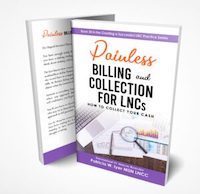How to Avoid Collection Problems
Do you have collection problems in your LNC business? Let’s explore some general principles of collecting payment from your clients. Follow these recommendations so that you don’t leave money on YOUR table.
This could happen to you if you’re in business as a legal nurse consultant.
- Clients request services for which they cannot pay.
- You provide services and then struggle to obtain payment.
- Slow payers strangle your cash flow.
- Payment issues poison your relationships with clients.
It doesn’t have to be that way! To a great degree, establishing a relationship with an attorney dictates what will occur in the relationship and how you will resolve collection challenges.
Here, I cover some of the aspects of control to ensure that you and your clients do not end up in conflict due to their inability to compensate you for your services. And you get to collect your cash.
Five Ways to Avoid Collection Problems
1. Know the Attorney
Many problems can be averted by not dealing with some people or organizations. Just because someone wants to conduct business with you doesn’t mean they are a good fit.
Suppose the attorney admits to having financial challenges during your initial contact. In that case, you should weigh the benefits of doing business with him and the potential hardship that such actions may have on your business.
If you have had difficulty collecting money from him in the past, be particularly cautious. Note this in your database to remind you if the client returns for more services.
Weigh the current financial situation the client may have and recognize the possibility that you may have trouble when you work to collect your cash. There may be a collection issue. If such a situation arises, install safeguards (i.e., collecting retainers, keeping the client on a shorter payment leash, and promptly acting if payment issues arise).
Ask yourself if you have the willpower, staying power, and firepower (resources) to chase a debtor. Many LNCs find this disheartening.
2. Establish Rapport with the Attorney
Once you’ve evaluated the potential risk of financial default if you decide to engage in a business relationship with the client, create a relationship built on mutual trust, respect, and the fact that you need funds to keep your business running. Set the expectation at the outset of the relationship that you expect the client to be a good payer and you will be able to collect your cash.
When creating a genuine bond with your client, don’t allow the client’s financial problems to become yours. Don’t act as a bank for your client. In essence, don’t inject empathy into the relationship when the client begins to tell you their financial tales of woe.
You’re setting up the relationship and how interactions will occur during such times. Set the stage appropriately.
One of my good clients asked me to work on product liability cases and wait until they were settled before asking for payment. The volume of cases would have required me to hire subcontractors, who wanted to be paid once they completed their case reviews. I turned down the work, knowing that I did not want to deal with a flow of subcontractors asking me for money, and I was not willing to fund the work from my bank account. The attorney ultimately used internal resources to get the work done.
3. Recognize the Attorney’s Excuses
When some clients are on the verge of experiencing financial challenges, they may hoard resources to sustain their livelihood. At this point, you must become insistent about receiving payment and establish a process to monitor future payments.
Don’t be caught up in rescuing the attorney. Paying your invoice should not hasten the demise of your client’s law firm.
Turn off the hook that enables you as a nurse to feel sorry for people and rescue them.
Note the attorney’s body language (nonverbal communication). By reading body language and listening to the nuances of speech in person and over the phone, you can gain insight into thoughts that clients may not verbally disclose. Such insight will give you a better glimpse into the real situation they may be dealing with.
4. Use Negotiation Strategies to Collect Your Cash
You can use numerous negotiation strategies to counter a client’s other strategies. The more strategies you’re aware of and use in the appropriate situations, the better positioned you’ll be to thwart the efforts of a client who may have funds but wishes to apply them for other purposes.
Identify points upon which you can apply leverage to collect your cash. As you progress in the relationship with your client, be attuned to opportunities where you may be able to apply pressure points, should a lack of payment make such actions necessary.
When possible, withhold service delivery until paid for – in advance. For example, don’t turn over a report until the invoice is paid in full. Ask for a retainer for your services and work until the retainer is almost depleted before asking for another retainer to continue to provide services. I can’t overemphasize this point.
LNCs who allow a client to run up a large bill often deeply regret doing so.
Be particularly sensitive to the client’s deadlines to provide information based on your services, as these occurrences often supply leverage opportunities. Have a policy that allows you to apply interest to unpaid invoices.
You may hear the advice to offer a promotion whereby you give the client a payback bonus (rebate) at the end of a specified period if the client pays the invoice in the manner specified by the agreement. This becomes a cost of doing business, which means it’s a cost incorporated into your overall pricing.
Be careful you structure a discount. For example, offering a 5% discount for quick bill payment may result in a client subtracting the discount from the check but not submitting the payment within the time frame needed to earn it. For this reason, I do not advocate this system of offering an incentive for quick payment.
Avoid Collection Problems Up Front
Client relations can be strained when payments become contested and you cannot collect your cash. Such actions can lead to bad blood between you and them, which could cause your business to incur financial hardships. To avoid these situations, choose your clients the way you’d choose your friends. If a client who was previously a prompt payer does not pay a bill, consider this a dangerous sign that something is wrong.
Has the client run into cash flow issues? Is the client unhappy with the services? Also, remember that a certain amount of business will go bad.
Thus, the better you manage the potential for bad clients, the more your bottom line will be enhanced. Offer payment plans that are acceptable to you and the client, for example. Giving the client some flexibility may strengthen your relationship and result in loyalty to you and your business.
For instance, one of my clients explained that he hit a significant cash flow issue and asked that I be patient. He was honest about his situation. He later called me to say he could not pay and that if I were willing to waive the fee, he would make it up to me. My willingness to be patient with him resulted in a flow of cases for the next 15 years.
5. Recommendations for Collecting Your Cash
- Learn to strike a balance between disagreeing and being disagreeable. Try never to create a situation that becomes unmanageable due to slow or non-payment. Maintain an attitude that conveys the belief that your client will do his best to complete payments on time.
- To the degree you can engage the client as a friend while maintaining the integrity of the business relationship. If a point occurs when you must discuss a payment situation, personalize yourself and speak from the financial discomfort that such an occurrence will have on you and your business.
- In considering with whom you’ll do business, ccontemplate the potential future ramifications of engaging in a business relationship with any entity. In some cases, there may be stop signs at the outset. Notice them, act on them, and avoid getting burned twice.
Get tailored billing and collections tips in my new book, “Painless Billing and Collections for LNCs: How to Collect Your Cash”. You would not believe how much blood, sweat and tears went into the advice I give you in this book. Learn from my experiences. Get it here.
By applying these strategies, you can significantly reduce your need to avoid the need to take drastic action.
However, if you do reach the stage of getting tough about collections, that doesn’t mean you failed. Despite your best efforts, you will encounter clients who refuse to pay or are unable to pay.
For more billing strategies, click here to get my book, “Painless Billing and Collections for LNC” today.

Pat Iyer is president of The Pat Iyer Group, which develops resources to assist LNCs in obtaining more clients, making more money, and achieving their business goals and dreams.
Pat’s related websites include the continuing education provided on LNCEU.com, the podcasts broadcast at podcast.legalnursebusiness.com, and writing tips supplied at patiyer.com.
Get all of Pat’s content in one place by downloading the mobile app, Expert Edu at www.legalnursebusiness.com/expertedu. Watch videos, listen to podcasts, read blogs, watch online courses and training, and more.



